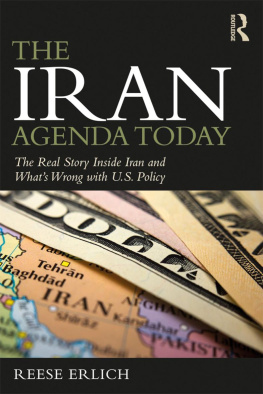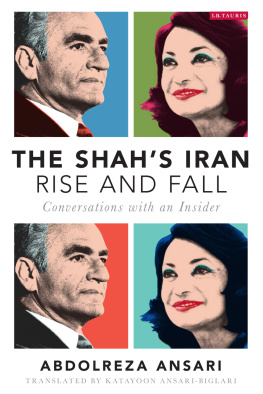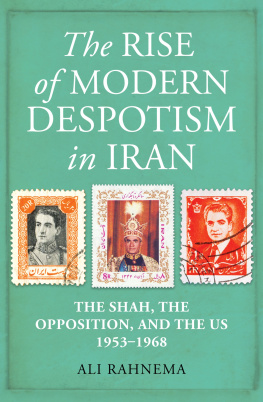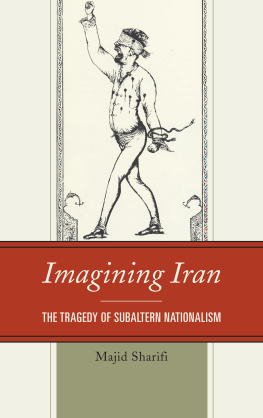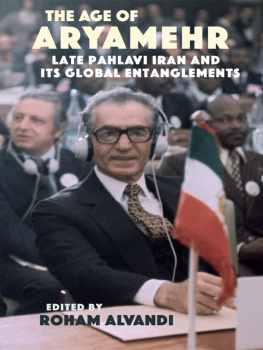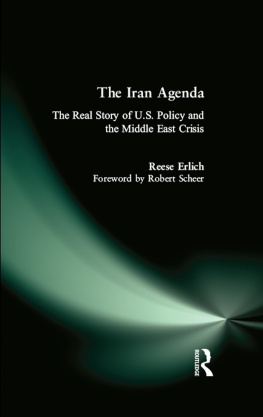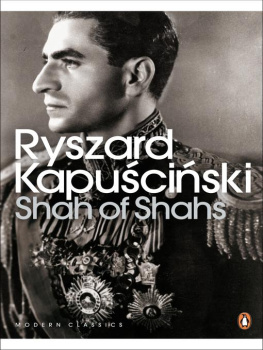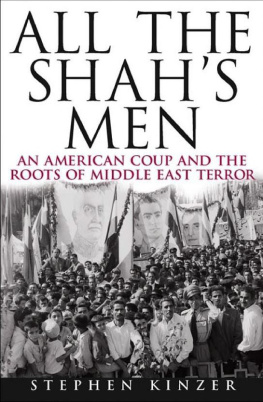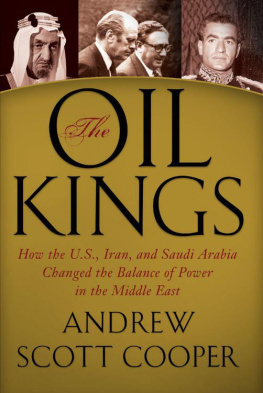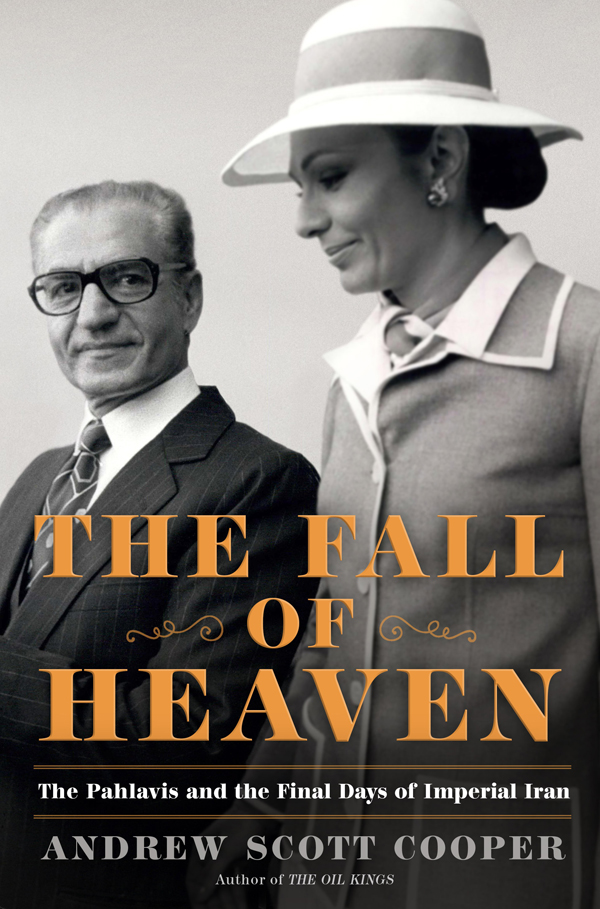

The author and publisher have provided this e-book to you for your personal use only. You may not make this e-book publicly available in any way. Copyright infringement is against the law. If you believe the copy of this e-book you are reading infringes on the authors copyright, please notify the publisher at: us.macmillanusa.com/piracy.
To My Friends
The Pahlavi Family
Mohammad Reza Shah (19191980). King-Emperor of Iran (19411979). Son of Reza Shah (18781944) and Taj ol-Moluk (18961982), whose marriage also produced Princess Shams (19171996), Princess Ashraf (19192016), and Prince Ali Reza (19221954). Mohammad Reza Shah married three times and fathered five children:
1. Princess Fawzia of Egypt (19212013). Queen-Empress of Iran (19411948). Daughter of King Faud I of Egypt (18681936) and sister of King Farouk I of Egypt (19201965). Her marriage to the Shah produced one daughter:
Princess Shahnaz (b. 1940). Married (1) Ardeshir Zahedi (b. 1928), son of General Fazlollah Zahedi (18971963), who led the 1953 army coup against Mohammad Mossadeq (18821967). (2) Khosrow Djahanbani (19422014), scion of a wellborn family whose conversion to fundamentalist Islam scandalized the Imperial Court.
2. Soraya Esfandiary-Bakhtiary (19322001). Queen-Empress of Iran (19511958). Her childless marriage to the Shah ended in divorce.
3. Farah Diba (b. 1938). Queen-Empress of Iran (19591979). Her marriage to the Shah produced two sons and two daughters:
Crown Prince Reza (b. 1960). Married Yasmine Etemad-Amini (b. 1968). The couple has three children: Princess Noor (b. 1992), Princess Iman (b. 1993), and Princess Farah (b. 2004).
Princess Farahnaz (b. 1963).
Prince Ali Reza (19662011). His relationship with Raha Didevar produced Princess Iryana Leila (b. 2011).
Princess Leila (19702001).
The Imperial Court and Government
Mahnaz Afkhami (b. 1941). Appointed in 1975 as only the second minister of womens affairs in the world.
Amir Aslan Afshar (b. 1922). Irans ambassador to Austria, the United States, Mexico, and West Germany. Served as the last grand master of ceremonies at the Imperial Court.
Asadollah Alam (19191978). Prime Minister (19621964) who crushed Khomeinis June 1963 rebellion and served loyally as minister of the Imperial Court (19671977).
Jamshid Amuzegar (b. 1923). Minister of finance (19651974) and minister of the interior (19741977). Appointed prime minister in 1977 to stabilize Irans economy.
Gholam Reza Azhari (19172001). Chief of staff of the Imperial Iranian Armed Forces (19711978). Appointed prime minister in November 1978 to head the military government.
Shahpur Bakhtiar (19141991). Opposition politician who served as the Shahs last prime minister. Assassinated in Paris by agents of the Islamic Republic.
Hossein Fardust (19171987). The Shahs closest childhood friend. Served as deputy head of Savak (19681978) and betrayed him to the revolutionaries.
Reza Ghotbi (b. 1938). The Queens cousin and close confidant. Served as director of National Iranian Radio and Television for a decade until September 1978.
Amir Abbas Hoveyda (19191979). Prime minister of Iran (19651977) and minister of the Imperial Court (19771978). Executed by the revolutionaries.
Nasser Moghadam (19211979). Led Savaks Third Directorate and G2 military intelligence before succeeding Nasiri as new Savak chief in June 1978. Executed by the revolutionaries.
Nematollah Nasiri (19111979). Commander of the Imperial Guard, head of National Police, and chief of Savak from 1965 to 1978 who favored tough measures to combat subversion. Appointed Irans ambassador to Pakistan in June 1978. Recalled and arrested for corruption. Executed by the revolutionaries.
Seyyed Hossein Nasr (b. 1933). Scholar of Islam who served as the last head of Queen Farahs Special Bureau. Favored Islamizing the monarchy to prevent revolution.
Hassan Pakravan (19111979). Chief of Savak who reformed the security forces and intervened to prevent Khomeinis execution in 1963. Executed by the revolutionaries.
Parviz Sabeti (b. 1936). Law graduate who rose to lead Savaks Third Directorate in the midseventies. Warned about the dangers of corruption and ill-timed liberalization.
Jafar Sharif-Emami (19101996). Prime minister (19601961) and president of the Senate (19641978). Served as prime minister from August to November 1978.
Ardeshir Zahedi (b. 1928). Son of General Fazlollah Zahedi, who married Princess Shahnaz. Served as foreign minister and ambassador to London and Washington.
The Shia Ulama or Clerical Leadership
Grand Ayatollah Abol Qasem Khoi (18991992). Paramount marja of the Shia faithful since 1970. Opposed Khomeinis ideas on religious government. Received Queen Farah on her ill-fated trip to Najaf in November 1978.
Grand Ayatollah Ruhollah Khomeini (19021989). Leader of hard-line group within the Shia ulama opposed to the 1906 Constitution and the Pahlavi state. Formulated the concept of Islamic government called velayat-e faqih . Exiled in 1964 for trying to overthrow the Shah. Returned to Iran in February 1979, seized power, and established an Islamic theocracy.
Imam Musa Sadr (1928?). Iranian-born, charismatic leader of Lebanons Shia community opposed to Khomeinis doctrine of velayat-e faqih. Disappeared in Libya in August 1978 en route to a secret meeting in West Germany with the Shahs envoy.
Grand Ayatollah Kazem Shariatmadari (19051986). Senior marja inside Iran who led the quietist ulama. Supported the 1906 Constitution. Opposed Khomeinis velayat-e faqih. Tried and failed to prevent the overthrow of the monarchy.
The Revolutionaries
Mehdi Bazargan (19081995). Former National Front official who led the breakaway Islamist group Liberation Movement of Iran. Held secret talks with U.S. embassy staff in an effort to win American support. Briefly held the post of prime minister of Iran after the revolution.
Abolhassan Banisadr (b. 1933). Leftist opposition figure who plotted revolution from exile in Paris. Persuaded Khomeini to lead an umbrella group of anti-Pahlavi opposition forces. Elected and later deposed as the Islamic Republics first president.
Sadegh Ghotzbadegh (19361982). Leftist who cultivated close ties to radical Arab regimes and Yasser Arafats PLO. Facilitated foreign aid to the anti-Pahlavi opposition. Foreign minister of the Islamic Republic later executed for plotting to overthrow Khomeini.
United States Embassy
George Lambrakis (b. 1931). Led Embassy Tehrans political section under Ambassador Sullivan. Held secret meetings with opposition leaders opposed to the Shah.
John Stempel (b. 1938). Lambrakiss deputy. Liaised with Soviet diplomat Guennady Kazankin. Cultivated Mehdi Bazargan and other prominent opposition figures.
William Sullivan (19222013). Ambassador to Iran. Oversaw secret talks with opposition leaders even as he pressed the Shah to restrain his security forces. Favored the Shahs departure from Iran and Khomeinis return from exile.
The White House
Zbigniew Brzezinski (b. 1928). White House national security adviser. Overestimated the Shahs durability and underestimated the threat posed by militant Islam.
Jimmy Carter (b. 1924). President whose ambivalence toward the Shah led to a debilitating split among his advisers about how to manage the collapse of the Pahlavi regime.


